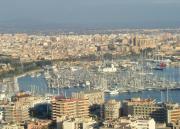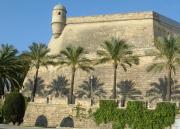| Most people think of mass tourism and high rise hotels when they think of the Spanish island of Mallorca, but, as I just found out, Palma, the island’s capital, is a great place for a long weekend. |

Feb 2005 |
|
 |
 |
 |
 |
 |
 |
 |
 |
Palma as seen from Castell de Bellver
 |
 |
Palma is the capital of Mallorca, the largest of the Balearic Islands in the Mediterranean Sea and only a two hour flight away from London (Prices for flights now start from around £40 return, buses run from the airport to the city centre every 15 minutes and cost 1,80 Euros for the 10 minute ride). Most visitors to the island head straight for the beaches, which is a real shame as the city has a lot to offer: a beautiful setting, an atmospheric old town, great restaurants and nightlife, excellent museums, fantastic shopping, lovely parks with countless fountains, stunning architecture – all in one compact package, that can easily be explored by foot.
Originally founded by the Romans around 123BC as the city of Palmeria, it expanded with the arrival of the Moors in AD 902, who built palaces and the original city walls. In the 13th century, Palma fell back into Christian hands through the conquest of Jaume I. Today there are few traces of the Romans and Moors left, instead the city has a Gothic feel, almost like a mini Barcelona. This feeling is also enhanced by the use of Catalan instead of Spanish by the Mallorquins.
Transport connections on Mallorca are excellent with two train routes (the old narrow-gauge railway from Palma to Soller and the modern trains between Palma and Inca), and a widespread and cheap bus network to the rest of the island.
Shopping is also a very pleasant experience in Palma, with many unique and beautiful shops in the old town and surprisingly little ‘tourist tat’; jewellery, especially Mallorcan pearls are very reasonable priced.
We went in the middle of January for a 4 day trip and were very lucky with the weather. Wall to wall sunshine and day temperatures of 18-20C made way to the worst snowfalls on the island for 25 years just a few days after we left.
|
|
| Favourite spots: |
 |
 |
 |
 |
 |
 |
 |
 |
El Baluard Museum in Bastio de Sant Pere
 |
 |
Palma’s latest museum is El Baluard, the Museum of Modern and Contemporary Art, built on the site of the remnants of the 16th century Bastio de Sant Pere. The museum only opened in 2004 and isn’t in any of the guide books, which means it isn’t overrun with tourists - yet. Modern and old architecture blend perfectly to create a museum that houses an impressive collection of sculptures, paintings and ceramics. But it isn’t only the art that impresses, the setting is beautiful, right on Passeig Maritim with stunning views across the harbour to the cathedral on side and the Castell de Bellver on the other. The large terrace (free entrance) with a stylish café invites you to enjoy the sunshine or watch the sun go down in the evening. Entrance is on the Placa Porta de Santa Catalina or walk up through the pleasant little park Placa La Feixina,with its many fountains, from the harbour.
|
|
| What's really great: |
|
The best view of Palma is to be had from the Castell de Bellver. You can either climb the 500 or so steps leading up the ‘Puig de sa Mesquida’, or, like us, take the easy option and take a taxi up to the castle and then walk back down the pine forest. Originally built by Jaum II at the beginning of the 14th century, its architecture is quite unusual; it is shaped like a giant doughnut with a massive circular courtyard and a separate tower joined to the rest of the building by an arch. For the 2 Euro entrance fee you can visit the castle’s flat roof and admire 360 degree views of the city, the bay and the surrounding countryside. You get also not just one but two museums thrown in, the Despuig Collection of Classical Sculpture and the excellent City History Museum, which takes you through the history of Palma from prehistoric times to the present.
|
|
| Sights: |
The Gothic Catherdral (La Seu) in Palma rises above the harbour like a giant ship and is as beautiful close up as it is from afar. Building work on it started in 1230 and lasted for nearly 400 years. Look out for the many gargoyles adorning the outside of the church and the massive eastern rose window, which is 12 m in diameter and made up from 1200 pieces of stained glass.
The cathedral overlooks Parc de la Mar with its man-made lake, co-designed by Joan Miro (there is a big mural by him in the park). Next to the cathedral is the Palau de Almudaina, built in the 14th century incorporating the walls of an Arab fortress. Today it houses a museum.
The Banys Arabs or Arab Baths from the 10th century make for a pleasant break when strolling through the old town. It is not huge and there isn’t that much to see, but the small garden is beautiful and there are tables and chairs where you can have a picnic. Look out for the typical Mallorcan courtyards in the old town’s alleys.
|
|
| Accommodations: |
|
The Hotel Born is a real find. It only has two stars, but I honestly don’t understand why. The location couldn’t be better, in a little side street just off the Placa Rei Joan Carles I it is only a few steps away from the old town with its sights and restaurants and a pleasant 5 minute stroll down the tree lined Passeig des Born to the cathedral and the harbour. The hotel was originally built in the 16th century as a palace for the Marquis de Ferandell and restored in the 18th century. As soon as you step through the entrance you feel transported back in time. The grand entrance hall with its marble floor and pillars, antiques and sweeping staircase to the 35 rooms on four floors is impressive. The rooms are quite big, clean, light and airy. Ask for one with view of the courtyard with its palm trees, where breakfast (a better than average buffet) is served in the summer months. The staff is friendly and helpful, the only drawback is the absence of a lift. www.hotelborn.com
|
|
| Nightlife: |
|
We didn't visit any clubs during our stay, but there are plenty, as well as jazz cellars and other music venues. We visited during one of the festivals and there was a free rock concert in Plaza Major.
|
|
| Hangouts: |
|
There are plenty of pubs and bars in Palma, especially in the district of La Lljota - perfect for a pub crawl. Start at El Fugal on Carrer de la Mar and work your way through dozens of places in the little alleyways of this quarter.
|
|
| Restaurants: |
Restaurants are plentiful in Palma – if you look in the right place! We, wrongly, assumed that the old town would be heaving with places to eat, but there they are few and far between. It took us a while, to find something we liked the look of, but in the end we found a very nice (and cheap!) tapas bar where a bottle of very passable house wine only cost 5 Euros and the food was delicious.The place to go is ‘Sa Llotja’, just west of the cathedral, where you’ll be absolutely spoilt for choice.
Darsena – Paseo Maritim: Bar/Café right on the harbourside, a great place to watch the ships and boats come in.
Bar Bosch –Pza Joan Carles I: Sip a coffee or a delicious hot chocolate and watch the world go by.
Cappuccino – several locations in Palma – try the one in Palau March:
Light meals & sandwiches & cappuccinos.
Vecchio Giovanni –c/ San Juan: Better than average Italian restaurant, cheerful staff.
La Trola – c/San Juan: Tapas and Spanish cuisine.
Lizarran: Nice Tapas bar full of locals.
|
|
| Other recommendations: |
|
After our original plan to go to Soller by rail had been scampered due to maintenance work, we decided to take a regular bus to Valldemossa, have a look around and then take another bus to Port Soller. After about 20 minutes we arrived in this picturesque village in the mountains of the Serra de Tramuntana, which apparently gets swamped with tourists during the season. Luckily for us, it being January, we had the place almost to ourselves. You can visit the former palace and monastery Real Cartuja de Jesus de Nazaret where Frederic Chopin and George Sand spent 4 months during the winter of 1838-39. There is also a small museum of contemporary art. In the lower part of the village is the church of san Bartomeu, dedicated to Mallorca’s only saint, Santa Catalina Tomas, whose image is displayed on a tile next to every front door in Valldemossa. The onward journey to Soller via Deia is full of wonderful views of the dramatic coastline. A great day out!
|
|
Published on Thursday February 10th, 2005
|
|
 Publish on Facebook
Publish on Facebook
|
Thu, Mar 17 2005 - 03:23 PM
 by femika
Sabine,
lovely pics and great report. |
Sat, Feb 12 2005 - 12:41 AM
 by ravinderkumarsi by ravinderkumarsi
| excellent pictures and well written report |
Fri, Feb 11 2005 - 07:26 PM
 by picasso by picasso
Fabulous report with a tons of information Sabine,was very Great pleasure for me to read.
And photographs are astonishing .I hope you had a fantastic time exploring this fascinating place.***** +
Boris
|
Fri, Feb 11 2005 - 01:25 PM
 by mistybleu by mistybleu
Sabine,
This is a great, inspiring report. I just loved the pictures also.
Rgds
Misty |
Fri, Feb 11 2005 - 12:34 PM
 by davidx by davidx
Hi
This is excellent. Where on earth did you take that great picture of the Cathedral. I'll be reading some more of yours. Thanks, David |
Fri, Feb 11 2005 - 10:52 AM
 by johnnye00 by johnnye00
| Great report, I never really knew about this place before |
Fri, Feb 11 2005 - 10:21 AM
 by bear495 by bear495
This is a wonderfully written report. It is great to see this.
Russ |
Fri, Feb 11 2005 - 08:34 AM
 by magsalex by magsalex
| Great report with some fab pictures. |
Fri, Feb 11 2005 - 06:43 AM
 by britman by britman
| Lovely to see you back on Globo writing excellent reports with great pictures. Congratulations ***** |
| Information: |
| Login if you are a member, or sign up for a free membership to rate this report and to earn globo points! |
|
| Denmark |
|
|
|
|
 |
| France |
|
|
 |
| Germany |
|
|
|
|
 |
| Greece |
|
|
|
|
 |
| Ireland |
|
|
 |
| Italy |
|
|
|
|
 |
| Mexico |
|
|
|
|
|
|
 |
| Morocco |
|
|
|
|
|

|
